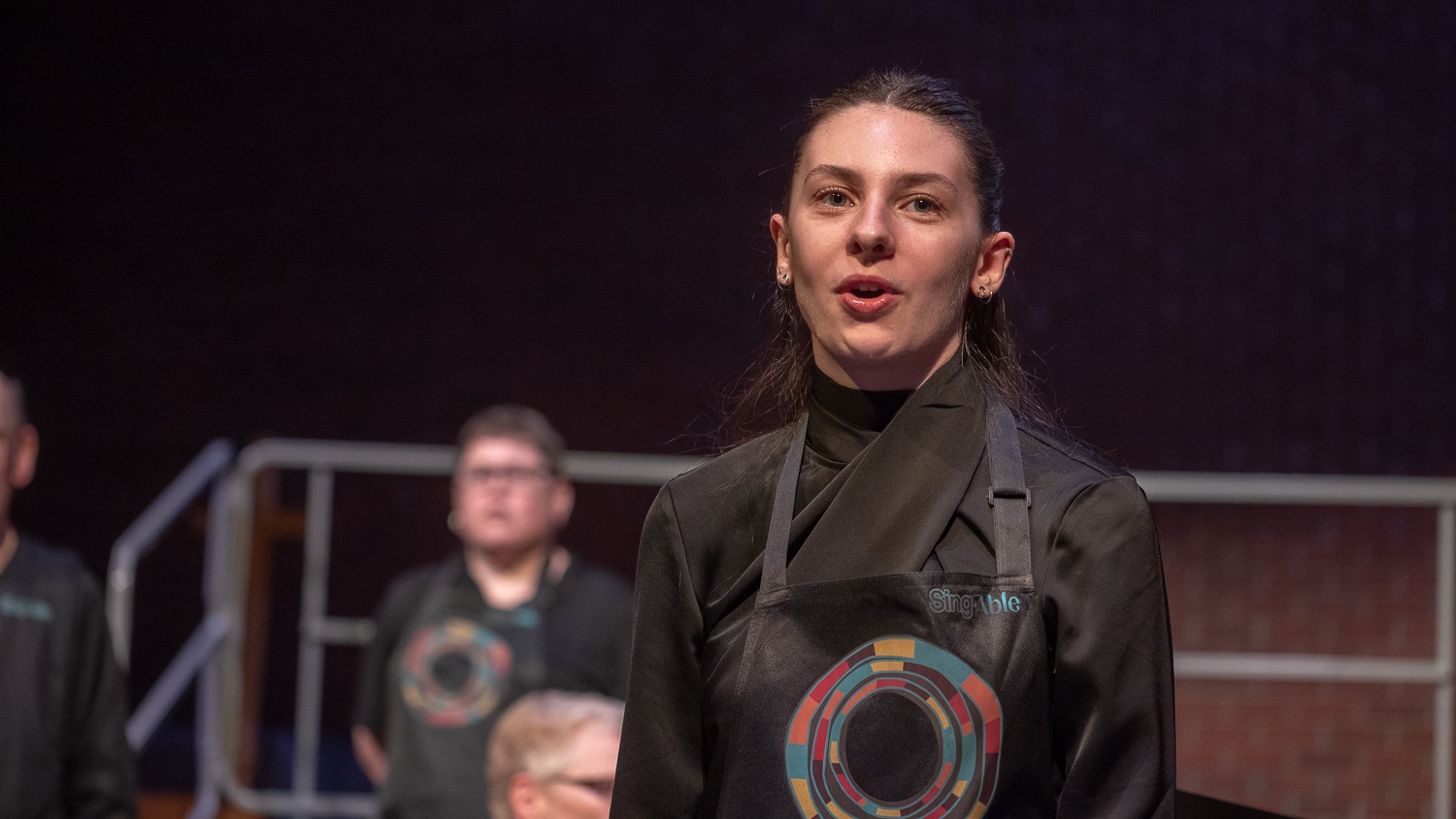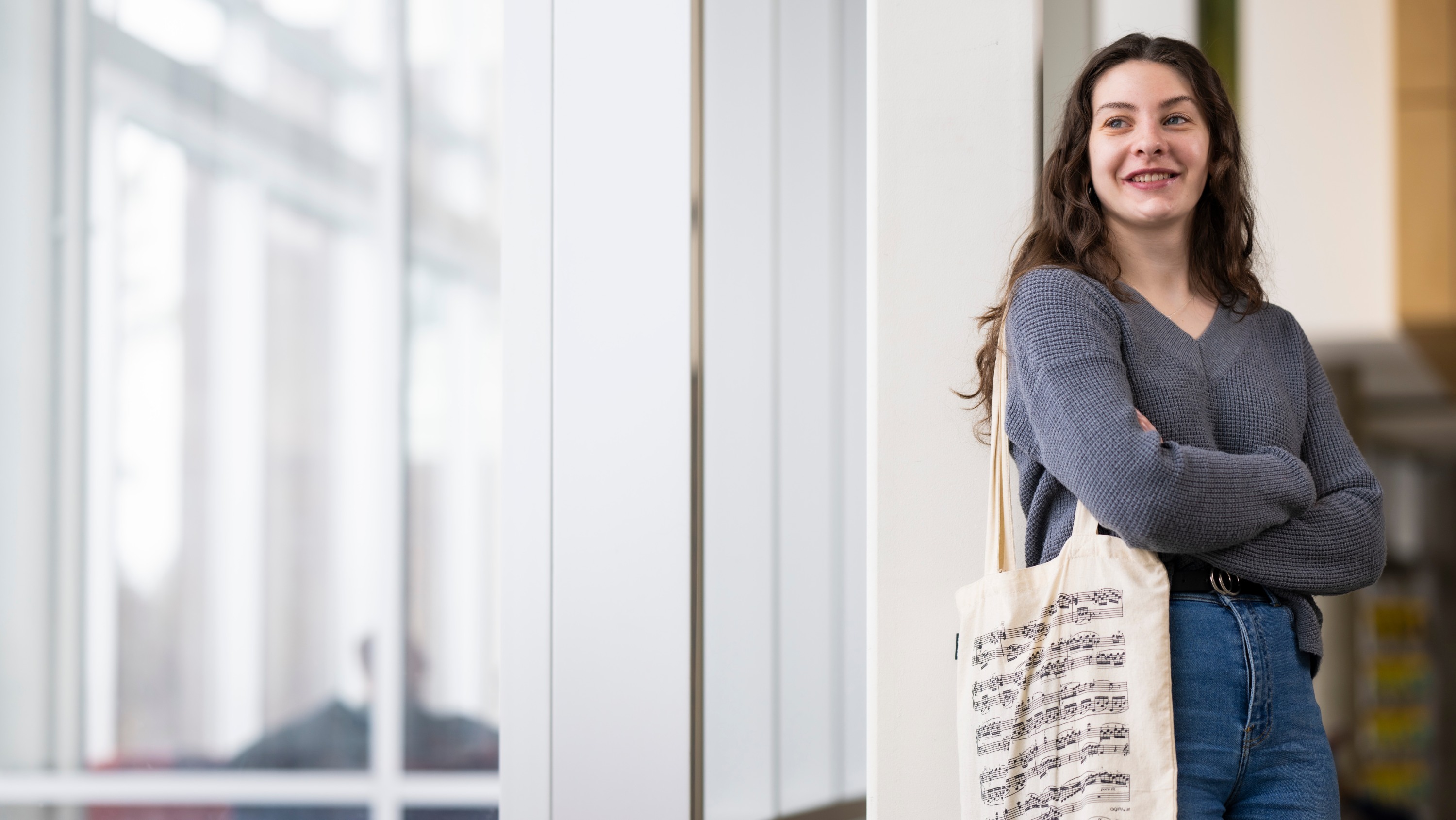Hannah Nichol loves to sing for people, and to see how it touches them.
“When I’m performing, the best compliment I could get is when someone says I pulled them along with me, that I was able to express myself in a way that allowed them to come on the journey with me,” says Nichol, who graduates on June 2 with a bachelor of music from the University of Alberta’s Augustana Campus.
After making sweet music as a student and campus choir member over the past four years, Nichol plans to apply her knowledge and share her deep appreciation for the art form to help others.
A repertoire of skills gained from her U of A experiences will help build a career in music therapy, helping people improve their mental health.
“I’ve been given lots of knowledge of what it takes to connect with people through music,” she says. “That’s going to allow me to share the experience of song.”
Raised by parents who both played musical instruments, Nichol learned to love music, and especially singing, from an early age.
“Singing was always fun for me,” she says. “You have to manipulate a musical instrument to make sound, but when I’m singing, it comes from me, and it adds another level of connection with people.”

Nichol grew up taking voice lessons, and when the time came for university, music was a natural choice — though she wasn’t sure of how to make a career of it. “I thought my only option was performing.” But when one of her professors, Ardelle Ries, told her about the profession of music therapy, Nichol knew it was just what she wanted.
“It was a weight lifted off my shoulders and I thought, ‘Now I have a plan.’”
Nichol’s father, besides playing the trumpet, is a doctor. So the duet of health and music to make a career appealed to her as a natural choice.
“We are coming to a new day and age where music and science are able to help each other, and are no longer so separate,” she believes. “When I feel down, I can turn on a radio or play music on my phone, and it conveys something that words cannot. Music is very healing, and I think a lot of people understand that.”
She credits the guidance of her professors, including Ries and John Wiebe, with providing one-on-one instruction to give her the skills she says she’ll need to become a music therapist.
“They definitely helped me build my knowledge of theory and aural skills,” Nichol says. “That allows me to think on my feet when I’m working with a client.
“I’ve also developed as a person, with being more outgoing and more eager to say yes to new things,” she adds.
A large part of that growth came from involvement with two campus-based choirs, representing one of her most beloved ways to make music.
“Choir is my favourite form of music, for the sense of community it creates. There’s something that really inspires me about people coming together to make music; we treat each other as family, and there’s a sense of empathy because we are relating to one another through song.”
The responsibilities she took on with both choirs “taught me leadership skills and how to work with others,” she says.
Nichol performed with the Augustana Choir not only to earn course credits, but also because she enjoyed it so much, and stayed on as a volunteer.
Besides honing her skills in everything from opera to musical theatre, Nichol worked offstage for the choir, setting up and taking down their performance space, helping raise funds for a European tour and eventually serving as president.
She was also a teaching assistant for three years with SingAble, a campus-based community choir open to people of all ages and abilities, including those with developmental disabilities.
Her time with SingAble opened up the opportunity to conduct research for Ries this summer. Using the group as a case study, Nichol is repeating a 2019 study of the choir that explored how a multigenerational, inclusive choir benefits community-building.
The initial study showed that almost all of the choir members felt better physically and mentally after rehearsals, and that they learned more about equality, diversity and inclusion by being part of the group, says Ries, director of SingAble. The findings of Nichol’s work will “provide a long view as to the impact that this program has on choristers,” she says.
“I hope the results raise awareness that music matters, that there’s a place for it in this world and that people appreciate and advocate for it,” adds Nichol.
Strengthened by all she’s learned through her U of A degree, Nichol believes she can make a difference using music to help people.
“I hope I can show others that music can benefit their lives the way it has done for me,” she says, adding that an arts degree offers the same array of opportunities as in any other field.
“You can absolutely get a good job with an arts degree, but it’s all about the effort you put in, and what you want to get out of it. That goes for any degree.”
Nichol was supported in her studies by the Jim and Norma Holmberg Scholarship in Music, the Harry and Betty Gaede Music Award, the Verda and J D McNeill Scholarship, the Cindy Ann Haywood Memorial Award in Music, an Augustana Faculty Fine Arts Awards in Choral, an Augustana Faculty Fine Arts Award in Drama, an Augustana Faculty Fine Arts Award in Vocal Music, the Augustana Faculty Honours Entrance Scholarship, the Dorothy Sherwood Memorial Scholarship in Music, the Olga Melsness Loberg Memorial Award, the Dianne Precht Memorial Scholarship in Music, the Louise McKinney Scholarship, the Max and Marjorie Ward Undergraduate Scholarship, the Dolores V. Nelson Schultz Memorial Award in Voice, and a University of Alberta Undergraduate Academic Scholarship. Nichol’s summer research project is being supported by a University of Alberta Endowment Fund for the Future: Support for the Advancement of Scholarship fund.
